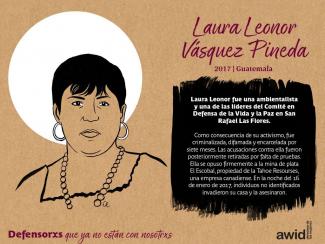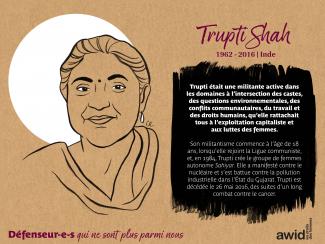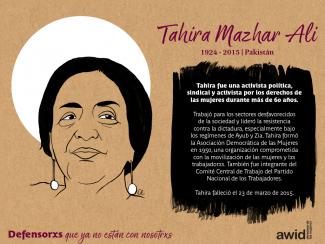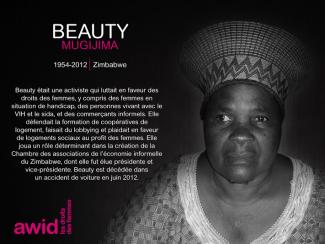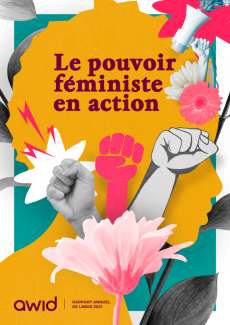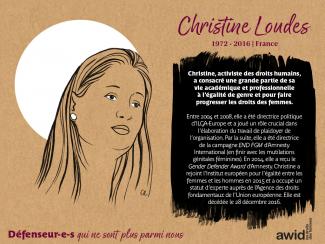Effective as of 25 Apr 2023.
Please click here to view the previous version of our Privacy Policy.
This Privacy Policy describes how the Association for Women’s Rights in Development and our subsidiaries and affiliates (“AWID,” “we,” “us” or “our”) handles personal information that we collect through our website that links to this Privacy Policy (the “Site”), as well as through social media, our marketing activities, our live events and other activities described in this Privacy Policy (“Service”).
Index
Personal information we collect
How we use your personal information
How we share your personal information
Your choices
Other sites and services
Security
International data transfers
Children
Changes to this Privacy Policy
How to contact us
Notice to European users
Personal information we collect
Information you provide to us. Personal information you may provide to us through the Service or otherwise includes:
- Contact data, such as your first and last name, salutation, email address, billing and mailing addresses, professional title and company name, and phone number.
- Demographic data, such as your city, state, country of residence, postal code, date of birth, gender, pronouns, preferred language of communication, and information about how you identify (race/ethnicity, disabilities, migrant, sex worker, etc.).
- Communications data, based on our exchanges with you, including when you contact us through the Service, social media, or otherwise.
- Marketing data, such as your preferences for receiving our marketing communications and details about your engagement with them.
- User-generated content data, such as profile pictures, photos, images, music, videos, comments, questions, messages, works of authorship, and other content or information that you generate, transmit, or otherwise make available on the Service, as well as associated metadata. Metadata includes information on how, when, where and by whom a piece of content was collected and how that content has been formatted or edited. Metadata also includes information that users can add or can have added to their content, such as keywords, geographical or location information, and other similar data.
- Payment data needed to complete transactions, including payment card information or bank account number.
- Other data not specifically listed here, which we will use as described in this Privacy Policy or as otherwise disclosed at the time of collection.
Automatic data collection. We, our service providers, and our business partners may automatically log information about you, your computer or mobile device, and your interaction over time with the Service, our communications and other online services, such as:
- Device data, such as your computer or mobile device’s operating system type and version, manufacturer and model, browser type, screen resolution, RAM and disk size, CPU usage, device type (e.g., phone, tablet), IP address, unique identifiers, language settings, mobile device carrier, radio/network information (e.g., Wi-Fi, LTE, 3G), and general location information such as city, state or geographic area.
- Online activity data, such as pages or screens you viewed, how long you spent on a page or screen, the website you visited before browsing to the Service, navigation paths between pages or screens, information about your activity on a page or screen, access times and duration of access, and whether you have opened our emails or clicked links within them.
Cookies and similar technologies. Some of the automatic collection described above is facilitated by cookies, which are small text files that websites store on user devices and that allow web servers to record users’ web browsing activities and remember their submissions, preferences, and login status as they navigate a site. Cookies used on our sites include both “session cookies” that are deleted when a session ends, “persistent cookies” that remain longer, “first party” cookies that we place and “third party” cookies that our third-party business partners and service providers place.
How we use your personal information
We may use your personal information for the following purposes or as otherwise described at the time of collection:
Service delivery and business operations. We may use your personal information to:
- provide, operate and improve the Service;
- communicate with you about the Service, including by sending announcements, updates, security alerts, and support and administrative messages;
- communicate with you about events or contests in which you participate;
- understand your needs and interests, and personalize your experience with the Service and our communications; and
- provide support for the Service, and respond to your requests, questions and feedback.
Research and development. We may use your personal information for research and development purposes, including to analyze and improve the Service. As part of these activities, we may create aggregated, de-identified and/or anonymized data from personal information we collect. We make personal information into de-identified or anonymized data by removing information that makes the data personally identifiable to you. We may use this aggregated, de-identified or otherwise anonymized data and share it with third parties for our lawful business purposes, including to analyze and improve the Service and promote our business.
Marketing. We and our service providers may collect and use your personal information to send you direct marketing communications. You may opt-out of our marketing communications as described in the Opt-out of marketing section below.
Compliance and protection. We may use your personal information to:
- comply with applicable laws, lawful requests, and legal process, such as to respond to subpoenas or requests from government authorities;
- protect our, your or others’ rights, privacy, safety or property (including by making and defending legal claims);
- audit our internal processes for compliance with legal and contractual requirements or our internal policies;
- enforce the terms and conditions that govern the Service; and
- prevent, identify, investigate and deter fraudulent, harmful, unauthorized, unethical or illegal activity, including cyberattacks and identity theft.
With your consent. In some cases, we may specifically ask for your consent to collect, use or share your personal information, such as when required by law.
Cookies and similar technologies. In addition to the other uses included in this section, we may use the Cookies and similar technologies described above for the following purposes:
- Technical operation. To allow the technical operation of the Service, such as by remembering your selections and preferences as you navigate the site.
- Functionality. To enhance the performance and functionality of our services.
- Analytics. To help us understand user activity on the Service, including which pages are most and least visited and how visitors move around the Service, as well as user interactions with our emails. For example, we use Google Analytics for this purpose. You can learn more about Google Analytics and how to prevent the use of Google Analytics relating to your use of our sites here: https://tools.google.com/dlpage/gaoptout?hl=en.
Retention. We generally retain personal information to fulfill the purposes for which we collected it, including for the purposes of satisfying any legal, accounting, or reporting requirements, to establish or defend legal claims, or for fraud prevention purposes. To determine the appropriate retention period for personal information, we may consider factors such as the amount, nature, and sensitivity of the personal information, the potential risk of harm from unauthorized use or disclosure of your personal information, the purposes for which we process your personal information and whether we can achieve those purposes through other means, and the applicable legal requirements.
When we no longer require the personal information we have collected about you, we may either delete it, anonymize it, or isolate it from further processing.
How we share your personal information
We may share your personal information with the following parties and as otherwise described in this Privacy Policy or at the time of collection.
Affiliates. Our corporate parent, subsidiaries, and affiliates, for purposes consistent with this Privacy Policy.
Service providers. Third parties that provide services on our behalf or help us operate the Service or our business (such as hosting, information technology, customer support, email delivery, marketing, consumer research and website analytics).
Payment processors. Any payment card information you use to make a purchase on the Service is collected and processed directly by our payment processors, such as Stripe. Stripe may use your payment data in accordance with its privacy policy, https://stripe.com/en-gb/privacy. You may also sign up to be billed by your mobile communications provider, who may use your payment data in accordance with their privacy policies.
Third parties designated by you. We may share your personal data with third parties where you have instructed us or provided your consent to do so. We will share personal information that is needed for these other companies to provide the services that you have requested. Moreover, you may choose to translate user-generated content using Google Translate. Google may use your user-generated content in accordance with its privacy policy, https://policies.google.com.Professional advisors. Professional advisors, such as lawyers, auditors, bankers and insurers, where necessary in the course of the professional services that they render to us.
Authorities and others. Law enforcement, government authorities, and private parties, as we believe in good faith to be necessary or appropriate for the compliance and protection purposes described above.
Other users. Your profile and other user-generated content data (except for messages) may be visible to other users of the Service. For example, other users of the Service may have access to your information if you chose to make your profile or other personal information available to them through the Service, such as when you provide comments, reviews, survey responses, or share other content. This information can be seen, collected and used by others, including being cached, copied, screen captured or stored elsewhere by others (e.g., search engines), and we are not responsible for any such use of this information.
Your choices
In this section, we describe the rights and choices available to all users. Users who are located in the United Kingdom, Switzerland, and the European Economic Area can find additional information about their rights below.
Opt-out of marketing communications. You may opt-out of marketing-related emails by following the opt-out or unsubscribe instructions at the bottom of the email, or by contacting us. Please note that if you choose to opt-out of marketing-related emails, you may continue to receive service-related and other non-marketing emails.
Declining to provide information. We need to collect personal information to provide certain services. If you do not provide the information we identify as required or mandatory, we may not be able to provide those services.
Delete your content or end your membership. You can choose to delete certain content you have provided to us. If you wish to request to end your membership, please contact us.
Other sites and services
The Service may contain links to websites, mobile applications, and other online services operated by third parties. In addition, our content may be integrated into web pages or other online services that are not associated with us. These links and integrations are not an endorsement of, or representation that we are affiliated with, any third party. We do not control websites, mobile applications or online services operated by third parties, and we are not responsible for their actions. We encourage you to read the privacy policies of the other websites, mobile applications and online services you use.
Security
We employ a number of technical, organizational and physical safeguards designed to protect the personal information we collect. However, security risk is inherent in all internet and information technologies and we cannot guarantee the security of your personal information.
International data transfer
We are headquartered in the United States and may use service providers that operate in other countries. Your personal information may be transferred to the United States or other locations where privacy laws may not be as protective as those in your state, province, or country.
Users in the United Kingdom, Switzerland, and the European Economic Area should read the important information provided below about transfer of personal information outside of the European Union.
Children
The Service is not intended for use by anyone under 18 years of age. If you are a parent or guardian of a child from whom you believe we have collected personal information in a manner prohibited by law, please contact us. If we learn that we have collected personal information through the Service from a child without the consent of the child’s parent or guardian as required by law, we will comply with applicable legal requirements to delete the information.
Changes to this Privacy Policy
We reserve the right to modify this Privacy Policy at any time. If we make material changes to this Privacy Policy, we will notify you by updating the date of this Privacy Policy and posting it on the Service or other appropriate means. Any modifications to this Privacy Policy will be effective upon our posting the modified version (or as otherwise indicated at the time of posting). In all cases, your use of the Service after the effective date of any modified Privacy Policy indicates your acknowledgment that the modified Privacy Policy applies to your interactions with the Service and our business.
How to contact us
- Email: Contact Us
- Mail: 192 Spadina Ave, Suite 300, Toronto, ON M5T 2C2
- Phone: 416 594 3773
Notice to European Users
Where this Notice to European users applies. The information provided in this “Notice to European users” section applies only to individuals located in the EEA or the UK (EEA and UK jurisdictions are together referred to as “Europe”).
Personal information. References to “personal information” in this Privacy Policy should be understood to include a reference to “personal data” (as defined in the GDPR) – i.e., information about individuals from which they are either directly identified or can be identified. It does not include “anonymous data” (i.e., information where the identity of individual has been permanently removed). The personal information that we collect from you is identified and described in greater detail in the section “Personal information we collect”.
Controller. AWID is the controller in respect of the processing of your personal information covered by this Privacy Policy for purposes of European data protection legislation (i.e., the EU GDPR and the so-called ‘UK GDPR’ (as and where applicable, the “GDPR”)). See the How to contact us section above for our contact details.
Our legal bases for processing. In respect of each of the purposes for which we use your personal information, the GDPR requires us to ensure that we have a “legal basis” for that use.
Our legal bases for processing your personal information described in this Privacy Policy are listed below.
- Where we need to process your personal information to deliver our Services to you (including our Site) (“Contractual Necessity”).
- Where it is necessary for our legitimate interests and your interests and fundamental rights do not override those interests (“Legitimate Interests”). More detail about the specific legitimate interests pursued in respect of each Purpose we use your personal information for is set out in the table below.
- Where we need to comply with a legal or regulatory obligation (“Compliance with Law”).
- Where we have your specific consent to carry out the processing for the Purpose in question (“Consent”).
We have set out below, in a table format, the legal bases we rely on in respect of the relevant Purposes for which we use your personal information – for more information on these Purposes and the data types involved, see How we use your personal information above.
|
Purpose
|
Categories of personal information involved
|
Legal basis
|
|---|
|
Service delivery and operations
|
- Contact data
- Demographic data
- User-generated content data
- Communications data
- Payment data
|
Contractual Necessity
|
|
Research and development
|
Any and all data types relevant in the circumstances
|
Legitimate interest. We have legitimate interest in understanding what may be of interest to our customers, improving customer relationships and experience, delivering relevant content to our customers, measuring and understanding the effectiveness of the content we serve to customers.
Consent, in respect of any optional cookies used for this purpose.
|
|
Direct marketing
|
- Contact data
- User-generated content data
- Payment data
- Communications data
- Marketing data
|
Legitimate Interests. We have a legitimate interest in promoting our operations and goals as an organisation and sending marketing communications for that purpose.
Consent, in circumstances or in jurisdictions where consent is required under applicable data protection laws to the sending of any given marketing communications.
|
|
Compliance and protection
|
Any and all data types relevant in the circumstances
|
Compliance with Law.
Legitimate interest. Where Compliance with Law is not applicable, we and any relevant third parties have a legitimate interest in participating in, supporting, and following legal process and requests, including through co-operation with authorities. We and any relevant third parties may also have a legitimate interest of ensuring the protection, maintenance, and enforcement of our and their rights, property, and/or safety.
|
|
Further uses
|
Any and all data types relevant in the circumstances
|
The original legal basis relied upon, if the relevant further use is compatible with the initial purpose for which the Personal Information was collected.
Consent, if the relevant further use is not compatible with the initial purpose for which the personal information was collected.
|
Retention. We retain personal information for as long as necessary to fulfill the purposes for which we collected it, including for the purposes of satisfying any legal, accounting, or reporting requirements, to establish or defend legal claims, or for compliance and protection purposes, unless specifically authorized to be retained longer.
To determine the appropriate retention period for personal information, we consider the amount, nature, and sensitivity of the personal information, the potential risk of harm from unauthorized use or disclosure of your personal information, the purposes for which we process your personal information and whether we can achieve those purposes through other means, and the applicable legal requirements.
When we no longer require the personal information, we have collected about you, we will either delete or anonymize it or, if this is not possible (for example, because your personal information has been stored in backup archives), then we will securely store your personal information and isolate it from any further processing until deletion is possible. If we anonymize your personal information (so that it can no longer be associated with you), we may use this information indefinitely without further notice to you.
Other information
No obligation to provide personal information. You do not have to provide personal information to us. However, where we need to process your personal information either to comply with applicable law or to deliver our Services to you, and you fail to provide that personal information when requested, we may not be able to provide some or all of our Services to you. We will notify you if this is the case at the time.
No Automated Decision-Making and Profiling. As part of the Services, we do not engage in automated decision-making and/or profiling, which produces legal or similarly significant effects. We will let you know if that changes by updating this Privacy Policy.
Security. We have put in place procedures designed to deal with breaches of personal information. In the event of such breaches, we have procedures in place to work with applicable regulators. In addition, in certain circumstances (including where we are legally required to do so), we may notify you of breaches affecting your personal information.
Your rights
General. European data protection laws give you certain rights regarding your personal information. If you are located in Europe, you may ask us to take any of the following actions in relation to your personal information that we hold:
- Access. Provide you with information about our processing of your personal information and give you access to your personal information.
- Correct. Update or correct inaccuracies in your personal information.
- Delete. Delete your personal information where there is no lawful reason for us continuing to store or process it, where you have successfully exercised your right to object to processing (see below), where we may have processed your information unlawfully or where we are required to erase your personal information to comply with local law. Note, however, that we may not always be able to comply with your request of erasure for specific legal reasons that will be notified to you, if applicable, at the time of your request.
- Portability. Port a machine-readable copy of your personal information to you or a third party of your choice, in certain circumstances. Note that this right only applies to automated information for which you initially provided consent for us to use or where we used the information to perform a contract with you.
- Restrict. Restrict the processing of your personal information, if, (i) you want us to establish the personal information's accuracy; (ii) where our use of the personal information is unlawful but you do not want us to erase it; (iii) where you need us to hold the personal information even if we no longer require it as you need it to establish, exercise or defend legal claims; or (iv) you have objected to our use of your personal information but we need to verify whether we have overriding legitimate grounds to use.
- Object. Object to our processing of your personal information where we are relying on legitimate interests (or those of a third party) and there is something about your particular situation that makes you want to object to processing on this ground as you feel it impacts on your fundamental rights and freedom – you also have the right to object where we are processing your personal information for direct marketing purposes.
- Withdraw Consent. When we use your personal information based on your consent, you have the right to withdraw that consent at any time. This will not affect the lawfulness of any processing carried out before you withdraw your consent.
Exercising These Rights. You may submit these requests by email. See the How to contact us section above for our contact details. We may request specific information from you to help us confirm your identity and process your request. Whether or not we are required to fulfill any request you make will depend on a number of factors (e.g., why and how we are processing your personal information), if we reject any request you may make (whether in whole or in part) we will let you know our grounds for doing so at the time, subject to any legal restrictions. Typically, you will not have to pay a fee to exercise your rights; however, we may charge a reasonable fee if your request is clearly unfounded, repetitive or excessive. We try to respond to all legitimate requests within a month. It may take us longer than a month if your request is particularly complex or if you have made a number of requests; in this case, we will notify you and keep you updated.
Your Right to Lodge a Complaint with your Supervisory Authority. In addition to your rights outlined above, if you are not satisfied with our response to a request you make, or how we process your personal information, you can make a complaint to the data protection regulator in your habitual place of residence.
- For users in the European Economic Area – the contact information for the data protection regulator in your place of residence can be found here: https://edpb.europa.eu/about-edpb/board/members_en.
- For users in the UK – the contact information for the UK data protection regulator is below:
The Information Commissioner’s Office
Water Lane, Wycliffe House
Wilmslow - Cheshire SK9 5AF
Tel. +44 303 123 1113
Website: https://ico.org.uk/make-a-complaint/
Data Processing outside Europe; we are a US-based company and many of our service providers, advisers, partners or other recipients of data are also based in the US. This means that, if you use the Services, your personal information will necessarily be accessed and processed in the US. It may also be provided to recipients in other countries outside Europe.
It is important to note that that the US is not the subject of an ‘adequacy decision’ under the GDPR – basically, this means that the US legal regime is not considered by relevant European bodies to provide an adequate level of protection for personal information, which is equivalent to that provided by relevant European laws.
Where we share your personal information with third parties who are based outside Europe, we try to ensure a similar degree of protection is afforded to it in accordance with applicable privacy laws by making sure one of the following mechanisms is implemented:
- Transfers to territories with an adequacy decision. We may transfer your personal information to countries or territories whose laws have been deemed to provide an adequate level of protection for personal information by the European Commission or UK Government (as and where applicable) (from time to time).
- Transfers to territories without an adequacy decision.
- We may transfer your personal information to countries or territories whose laws have not been deemed to provide such an adequate level of protection (e.g., the US, see above).
- However, in these cases:
- we may use specific appropriate safeguards, which are designed to give personal information effectively the same protection it has in Europe – for example, standard-form contracts approved by relevant authorities for this purpose; or
- in limited circumstances, we may rely on an exception, or ‘derogation’, which permits us to transfer your personal information to such country despite the absence of an ‘adequacy decision’ or ‘appropriate safeguards’ – for example, reliance on your explicit consent to that transfer.
You may contact us if you want further information on the specific mechanism used by us when transferring your personal information out of Europe.
